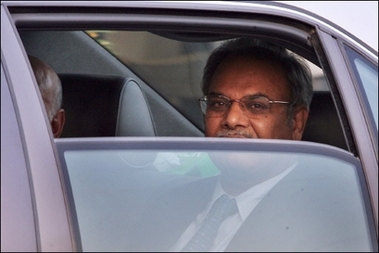Terror to top agenda as India, Pakistan resume peace talks
(AFP)Updated: 2006-11-14 10:05 NEW DELHI - India and Pakistan are to resume peace talks with New Delhi expected to press Islamabad to rein in Kashmiri militants.
The peace process between the South Asian rivals has been on hold since train bombings in Mumbai in July which India blamed on Pakistan, a charge Islamabad denied.
|
|
"I am looking forward to very constructive discussions with (the Indian) foreign secretary," Riaz Mohammad Khan told reporters Monday on his arrival in New Delhi.
New Delhi suspended the talks scheduled for July, blaming the Mumbai attacks on Pakistan's military spy agency, the Inter-Services Intelligence (ISI), but Islamabad rejected the claim.
The two sides agreed to set up an anti-terror mechanism when Indian Prime Minister Manmohan Singh and Pakistan's President Pervez Musharraf met in September in Cuba.
"They will surely discuss the mechanism. India is likely to provide part of the evidence of Pakistan's involvement in bombings," said Sukh Deo Muni, former professor of South Asian Studies at Jawaharlal Nehru University.
Foreign Minister Pranab Mukherjee said last week that India would ask Pakistan to honour its previous commitments to halt militant attacks on Indian soil.
"Terrorism is an important issue because earlier talks were suspended because of the public outrage after Mumbai blasts," Mukherjee said.
"I would like them to stick to assurances (to check militants) which they have given."
Analysts warned against expecting a breakthrough but said that the South Asian neighbours, which both have nuclear capabilities, must not desert the peace process launched in 2004.
"Not all talks will lead to any major outcome. The greater success lies in the fact that these talks should have a regularity that is predictable," said C. Uday Bhaskar of the government-funded Institute for Defence Studies and Analysis.
"The main question is not whether the joint terror mechanism will deliver. It is about India's ability to construct a framework of risks and rewards to Pakistan on cross-border terrorism," strategic affairs editor C. Raja Mohan wrote in the Indian Express newspaper.
The officials were also expected to discuss the proposed demilitarisation of the Siachen glacier -- the world's highest battlefield in the disputed Kashmir region, and the demarcation of a contested marsh on India's western border.
The two nations' peace process has made little headway on the central issue of the Kashmir region, which is divided between the two but claimed in full by both.
Kashmir has been the trigger of two of the three wars India and Pakistan have fought since their independence from Britain in 1947.
|
||
|
||
|
|

